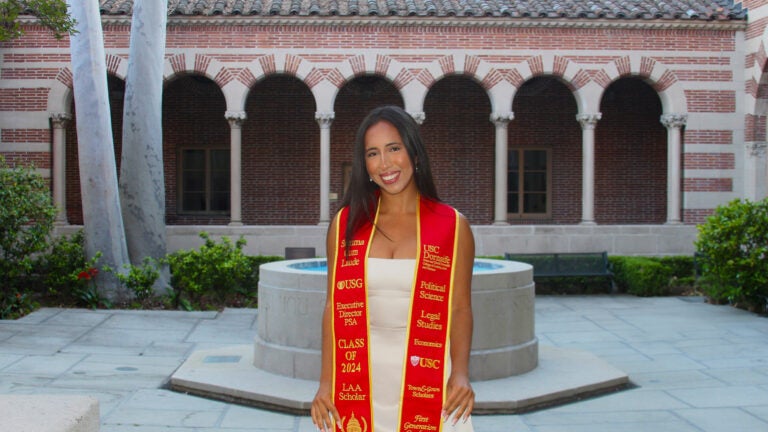
Once unhoused and despite a family loss, USC Dornsife senior graduates and heads to Yale law school
In 2020, as the country grappled with the COVID-19 pandemic, Sophia Perez’s father lost his job. Perez, her parents and her four siblings were forced to leave their home in Whittier, Calif., and move in with Perez’s aunt, where they shared one room.
As she prepares to graduate May 10 with a degree in political science, and minors in economics and legal studies, from the USC Dornsife College of Letters, Arts and Sciences, Perez reflects on the experience. She says she learned firsthand how precarious housing can be, and how homelessness takes many forms.
Lessons from family experience
“When people think of what it means to be unhoused, it’s typically an ‘on-the-street’ type of homelessness,” she explains. “But I learned that not owning or renting a home — just living out of another person’s home — is also a form of ’sheltered’ homelessness.”
A senior in high school when she was unhoused, Perez began contemplating how discriminatory zoning laws, particularly those that harm and exclude people of color, as well as access to basic resources, such as transportation and education, factor into job security, generational wealth and property ownership.
Her family’s situation became essentially a case study: Her parents worked hard, Perez explains, but they were at a disadvantage, lacking college degrees and coming from immigrant families. (Her father came from Cuba and her mother’s family from Mexico.) This put them at higher risk of just the kind of situation they were in. Perez would take the lessons from the experience to heart.
Perhaps because they did not have degrees and understood the limitations of hard work alone, her parents had always stressed the value of higher education to their children, a big reason Perez applied to USC.
Having been accepted shortly before becoming unhoused, Perez might have worried that her dream of attending USC was in jeopardy. Fortunately, she received several awards to support her, including scholarships from the USC Latino Alumni Association, Town & Gown and the USC Alumni Association’s Trojan League of Los Angeles.
She was also a Warren Bennis Scholar and received a Hispanic Scholarship Fund award.
“I’ve gotten such an amazing, incredible worldview from all the diverse students that I’ve met at USC, and I’m all the better for it.”
A tragic turn
Perez began her USC Dornsife studies in fall 2020, online for her first year due to the COVID-19 pandemic. Her father soon secured employment and her family was able to find a home again. Things were looking up.
But the family was soon struck with more bad news when her father was diagnosed with stage IV stomach cancer.
Perez was devastated. She and her father, longtime USC fans, would attend football games together and visit the campus when she was a child. Dreams of continuing those traditions, now with Perez a student at the university, suddenly became uncertain.
When campus reopened in 2021, Perez was able to move into campus housing as her sophomore year began, something her father had hoped for her. They made the most of it.
“My dad was pretty weak by then, but it had been his dream for me to live on campus. I took him to football games, to awards ceremonies and even to one of my classes,” she says. “But then, towards the spring of my sophomore year, he started to get sicker.”
Her father’s cancer progressed rapidly, and he died in April 2022.
Driven to help those in need
Despite the exceptional hardships, Perez soldiered on, using her experiences as fuel that drives her to help underserved communities fight for housing security. When she heads to Yale Law School later this year, she plans to take a large step toward making a career of that work.
A large step, but not the first one. While at USC Dornsife, Perez served as executive director of the Political Student Assembly, where she organized events to increase political education and civic engagement on campus. She also interned for the Legal Aid Foundation of Los Angeles and the L.A. County District Attorney’s Office.
The scholarships, courses, internships and work experience Perez gained while at USC Dornsife laid a solid foundation for her future work, she says. Her ability to have a concentration on law and human rights enabled her to pursue her passion, her professors pushed her to work hard and always improve, and she was able to apply her classroom lessons to real-world problems continuously throughout her time at the university.
“I did a lot of work in government services in L.A., and I really valued not only interacting with my community, but also giving back in a way that I really didn’t think I’d be able to while in college,” she says. “I’ve absolutely loved USC. I’ve gotten such an amazing, incredible worldview from all the diverse students that I’ve met at USC, and I’m all the better for it.”